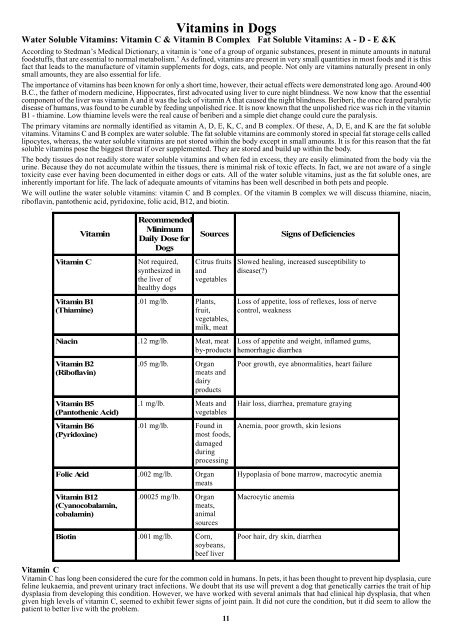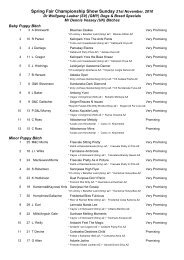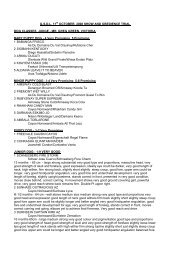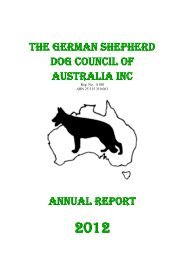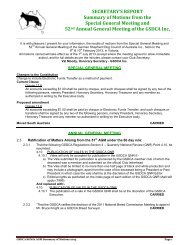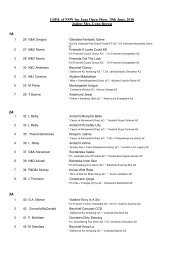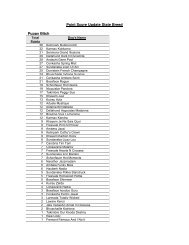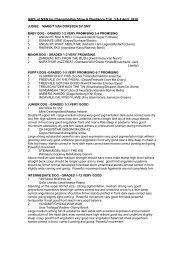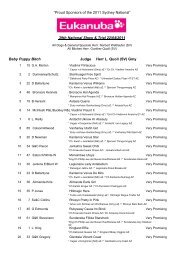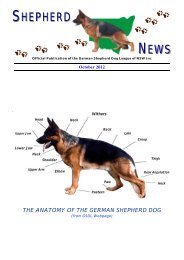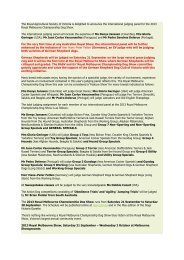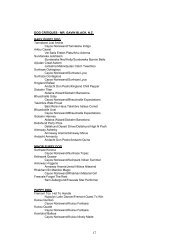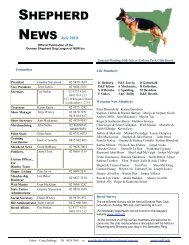Shepherd News 2 - German Shepherd Dog League NSW Inc.
Shepherd News 2 - German Shepherd Dog League NSW Inc.
Shepherd News 2 - German Shepherd Dog League NSW Inc.
You also want an ePaper? Increase the reach of your titles
YUMPU automatically turns print PDFs into web optimized ePapers that Google loves.
Vitamins in <strong>Dog</strong>s<br />
Water Soluble Vitamins: Vitamin C & Vitamin B Complex Fat Soluble Vitamins: A - D - E &K<br />
According to Stedman’s Medical Dictionary, a vitamin is ‘one of a group of organic substances, present in minute amounts in natural<br />
foodstuffs, that are essential to normal metabolism.’ As defined, vitamins are present in very small quantities in most foods and it is this<br />
fact that leads to the manufacture of vitamin supplements for dogs, cats, and people. Not only are vitamins naturally present in only<br />
small amounts, they are also essential for life.<br />
The importance of vitamins has been known for only a short time, however, their actual effects were demonstrated long ago. Around 400<br />
B.C., the father of modern medicine, Hippocrates, first advocated using liver to cure night blindness. We now know that the essential<br />
component of the liver was vitamin A and it was the lack of vitamin A that caused the night blindness. Beriberi, the once feared paralytic<br />
disease of humans, was found to be curable by feeding unpolished rice. It is now known that the unpolished rice was rich in the vitamin<br />
B1 - thiamine. Low thiamine levels were the real cause of beriberi and a simple diet change could cure the paralysis.<br />
The primary vitamins are normally identified as vitamin A, D, E, K, C, and B complex. Of these, A, D, E, and K are the fat soluble<br />
vitamins. Vitamins C and B complex are water soluble. The fat soluble vitamins are commonly stored in special fat storage cells called<br />
lipocytes, whereas, the water soluble vitamins are not stored within the body except in small amounts. It is for this reason that the fat<br />
soluble vitamins pose the biggest threat if over supplemented. They are stored and build up within the body.<br />
The body tissues do not readily store water soluble vitamins and when fed in excess, they are easily eliminated from the body via the<br />
urine. Because they do not accumulate within the tissues, there is minimal risk of toxic effects. In fact, we are not aware of a single<br />
toxicity case ever having been documented in either dogs or cats. All of the water soluble vitamins, just as the fat soluble ones, are<br />
inherently important for life. The lack of adequate amounts of vitamins has been well described in both pets and people.<br />
We will outline the water soluble vitamins: vitamin C and B complex. Of the vitamin B complex we will discuss thiamine, niacin,<br />
riboflavin, pantothenic acid, pyridoxine, folic acid, B12, and biotin.<br />
Vitamin C<br />
Vitamin B1<br />
(Thiamine)<br />
Vitamin<br />
Recommended<br />
Minimum<br />
Daily Dose for<br />
<strong>Dog</strong>s<br />
Not required,<br />
synthesized in<br />
the liver of<br />
healthy dogs<br />
Sources<br />
Citrus fruits<br />
and<br />
vegetables<br />
.01 mg/lb. Plants,<br />
fruit,<br />
vegetables,<br />
milk, meat<br />
Niacin .12 mg/lb. Meat, meat<br />
by-products<br />
Vitamin B2<br />
(Riboflavin)<br />
Vitamin B5<br />
(Pantothenic Acid)<br />
Vitamin B6<br />
(Pyridoxine)<br />
.05 mg/lb. Organ<br />
meats and<br />
dairy<br />
products<br />
.1 mg/lb. Meats and<br />
vegetables<br />
.01 mg/lb. Found in<br />
most foods,<br />
damaged<br />
during<br />
processing<br />
Folic Acid .002 mg/lb. Organ<br />
meats<br />
Vitamin B12<br />
(Cyanocobalamin,<br />
cobalamin)<br />
.00025 mg/lb. Organ<br />
meats,<br />
animal<br />
sources<br />
Biotin .001 mg/lb. Corn,<br />
soybeans,<br />
beef liver<br />
Signs of Deficiencies<br />
Slowed healing, increased susceptibility to<br />
disease(?)<br />
Loss of appetite, loss of reflexes, loss of nerve<br />
control, weakness<br />
Loss of appetite and weight, inflamed gums,<br />
hemorrhagic diarrhea<br />
Poor growth, eye abnormalities, heart failure<br />
Hair loss, diarrhea, premature graying<br />
Anemia, poor growth, skin lesions<br />
Hypoplasia of bone marrow, macrocytic anemia<br />
Macrocytic anemia<br />
Poor hair, dry skin, diarrhea<br />
Vitamin C<br />
Vitamin C has long been considered the cure for the common cold in humans. In pets, it has been thought to prevent hip dysplasia, cure<br />
feline leukaemia, and prevent urinary tract infections. We doubt that its use will prevent a dog that genetically carries the trait of hip<br />
dysplasia from developing this condition. However, we have worked with several animals that had clinical hip dysplasia, that when<br />
given high levels of vitamin C, seemed to exhibit fewer signs of joint pain. It did not cure the condition, but it did seem to allow the<br />
patient to better live with the problem.<br />
11


